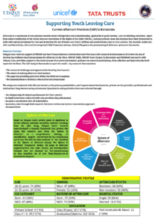“Current Aftercare Practices” (CAP) is a research study conducted in the State of Karnataka, and is part of a multi-state study, conducted in five States, including Maharashtra, Rajasthan, Gujarat, and Delhi. This study is an initiative of Udayan Care, supported and funded by UNICEF, Tata Trusts and other partners, and is based on the premise that every child, who leaves an Alternative Care setting on completing 18 years of age or becomes a ‘Care Leaver’(CL), needs extended support in the form of Aftercare. The CAP study gathers evidence through a scientific data collection process, consolidates knowledge and promising practices, and discusses gaps and challenges from a multi-stakeholder perspective. At various stages, the study has employed participatory methods to incorporate the voices of Care Leavers as well as the critical feedback from key stakeholders and experts.
Udayan Care has developed a conceptual and analytical framework, called, the ‘Sphere of Aftercare’, drawing from its experience in child protection, the extensive literature review undertaken, and the findings of the pilot study it conducted in Delhi (2017). The ‘Sphere of Aftercare’ comprehensively identifies 8 different domains of Aftercare, which are affordable and adequate housing, independent living skills, interpersonal skills and social relationships, mental and emotional wellbeing, physical health, financial independence and career, education and vocational skills, and identity and legal awareness. The CAP study is designed to look at the support and services received by CLs from the objective lens of an ‘Aftercare Quality Index,’(AQI), calculated using the scores obtained on each of these 8 domains.
The report covers a total of 108 CLs from Karnataka, comprising of 47 males and 61 females, from both Government and NGO-run Child Care Institutions (CCIs). The key findings of the study show that there is tremendous scope for development of Aftercare in the State of Karnataka. There are many areas where we, as duty-bearers, need to rise to the call to meet the aspirations of the CLs.


